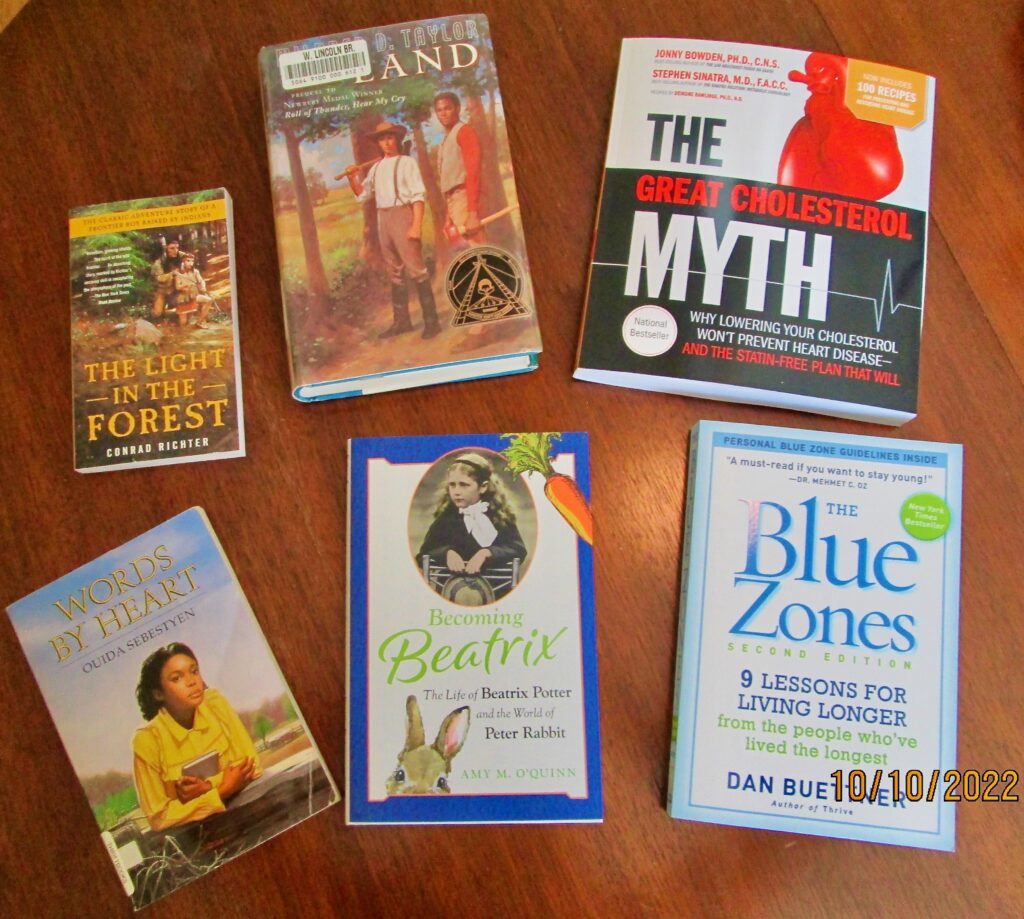
I was given an Amazon gift card from my daughter and her family for my birthday. And my daughter knows me well, she suggested I buy books:)
In the picture above, I didn’t show The Cay, (I had borrowed it from the library) on which I did a review last week, but it was included in the haul. I also didn’t purchase the Words By Heart (it is on loan from my daughter’s collection of books) or The Blue Zones books at this time.
And, of course you can tell The Land by Mildred D. Taylor is a library book. Although I found it in the middle grade section, I view it as more of a book for adults. I have been fascinated by it and have a hard time putting it down to go do other things. It has great historical points and also teaches valuable lessons in how to deal with others that are different than you. But, I definitely don’t recommend it for younger audiences.
I ordered The Light In The Forest because I couldn’t find it at our local library. When Debbie from https://debradupreewilliams.com/ mentioned she read it with her boys when they were young, it made me want to read it for material to share.
Becoming Beatrix was recommended by Jennifer L. Scott on her YouTube channel :https://www.youtube.com/channel/UCEnEnLT5wBVnK56QFRg_Iwg. I haven’t started it yet.
I’ve had the Blue Zone book for awhile but this week I moved it to the top of my reading list as I’m trying to figure out a healthier way to eat.
At the very top of my reading list right now is The Great Cholesterol Myth by Jonny Bowden and Stephen Sinatra. I am reading it out of desperation. My primary doctor is a holistic doctor. She recommended it to me and I am grateful for that.
My heart doctor put me on Cholesterol medication earlier this year and about a month ago switched it to Crestor. The previous medication was Pravastatin which wasn’t working but it also had the side effect of making my hair fall out. I was excited to switch to Crestor because it doesn’t cause the thinning hair. But—one of its biggest side effects is brain fog, memory loss, and confusion. It can also cause weak, aching muscles, nausea, and constant exhaustion. I had all of those.
But the scariest was last Thursday when I did a bank transfer in our account and have no memory of doing it—at all. I had already ordered the Cholesterol Myth book and it arrived Sunday. I stopped my medication and began reading. Now if I can just remember what I read:) Just kidding!
So far I have found out that Cholesterol is very necessary to protecting against inflammation and for helping your brain to work properly (hummm… wonder if taking away that Cholesterol may be the cause of memory loss???). Eating fat doesn’t increase Cholesterol. In fact, people that eat more fat (especially olive oil) usually have lower Cholesterol because their bodies don’t have to make as much.
There is a correlation between higher Cholesterol and stress. Dr. Sinatra tells of a time when he had labs drawn before beginning his day as a cardiac surgeon. The Cholesterol from that lab draw was 180. He had three cardiac catheterizations to perform and on the last one the patient had a cardiac arrest and had to be resuscitated. The procedure took five hours to complete requiring multiple catheters and medications. As Dr. Sinatra was walking to the cafeteria to eat he passed the lab where his blood had been drawn that morning. He says, “Because I had a strong belief in the effect of psychological stress on the body, I was curious to see whether the day’s activities had produced any changes in my own blood.” He had his blood drawn again. His Cholesterol was now a whopping 240 mg/dl. He says,”… a number that would cause virtually any conventional practitioner to put me on a statin drug immediately.” Plus— he had been fasting for nearly 20 hours at this point in his day. (See page 165 of the book for quotes and details of the study).
The biggest culprit for heart disease is sugar.
This is— What You Need to Know— bullets from page 58 of the book.
- The number one dietary contributor to heart disease is sugar, which is a far greater danger to your heart than fat.
- Sugar contributes to inflammation in the artery walls.
- Sugar is the missing link among diabetes, obesity, and heart disease.
- High sugar intakes drive up the hormone insulin, which raises blood pressure and increases cholesterol.
- Sugar and processed carbs raise triglycerides, which are an important and independent risk factor for heart disease.
- When sugar in the bloodstream sticks to proteins, it creates damaging and toxic molecules called advanced glycation end products, or AGEs.
- This same process also damages LDL, contributing to inflammation and ultimately to heart disease.
I still have a lot to read in this book, but I plan to not go back on any Statin drugs. I want to get my Cholesterol down with diet and exercise.
Sooo…. what’s on your reading list? [Remember to read a few things for fun—after all, we need to reduce that stress:)]
Here’s a beautiful stress reducer. My daughter-in-law and son gave me this beautiful flower for my birthday this week. The colors are amazing and it smells wonderful too. Very Cholesterol lowering:)


Thanks for sharing. I’m glad you are investigating what is healthy for you. It is something we must all do – and it may change as we age.
It really does change as we age for sure:)